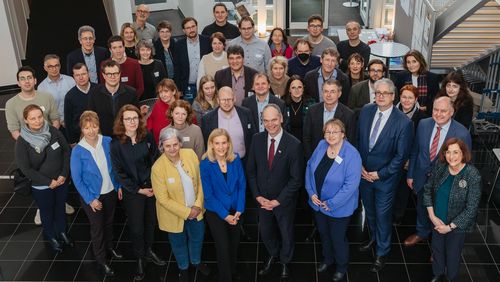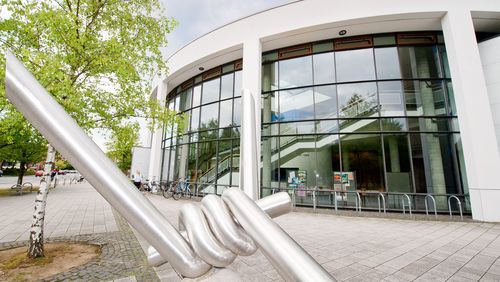Ralph Bruder has been university president since August. Now, he was oficially inaugurated. Bruder will steer the university for the coming six years. In his speech, he called for continuing to courageously pursue new approaches.
With the inauguration of Prof. Dr Ralph Bruder, the invited guests of the University and the Universitätsgesellschaft Oldenburg e.V. (UGO) celebrated the ceremonial opening of the academic year, AUFTAKT 21/22 – on a small scale due to the Covid-19 pandemic. The guests included Lower Saxony's Minister of Science Björn Thümler, Oldenburg's Lord Mayor Jürgen Krogmann and the Chairman of the University Council Jörg Waskönig. The ceremony was broadcast via livestream.
"I am very pleased that we have succeeded in winning Professor Ralph Bruder as new president," said Lower Saxony's Science Minister Björn Thümler. "As an occupational scientist, he is ideally prepared for the challenges in teaching, research and transfer that such a dynamically developing university as the University of Oldenburg brings with it. And I don't just mean the increase in medical student places from 80 to 120 at the European Medical School. Much has been initiated in recent years that now needs to mature or will deliver lasting returns for Oldenburg as a centre of science. I look forward to new impulses and good cooperation."
A forward-looking profile
In his speech, the new president – in office for just over a hundred days – described Oldenburg University as a special place for teaching, learning, researching, and working. For Bruder, it combines "an attitude that advocates open and humane science in the spirit of Carl von Ossietzky, after whom the university is named, with a forward-looking profile aimed at sustainable social development."
In his view, the university acts authentically: It dedicates itself to the three topics of environment and sustainability, humans and technology, as well as society and education in research and teaching while making the findings relevant for the general public. And it also implements these topics in its own organisation. As an example, Bruder referred to the university's efforts to achieve climate neutrality. "We don't just do research on sustainability, we live it ourselves," Bruder said, "we do what we say."
Close cooperation between the city and the university
For regional development in the north-western part of Germany, the university is an important driver, the president emphasized. Reaffirming the effort to transfer applicable knowledge to society, Bruder announced his intention to further expand this role of the university in the coming years and to make it even more visible. "Our university should see it as its duty to contribute comprehensively to discussions in society as a whole," Bruder said. For example, he is very much in favour of researchers taking an insight-based stance on current issues. "This is not about subjective opinions, but about bringing well-founded scientific findings into the debate in an offensive way," he said. In this context, his goal is also to network the university even more closely with other universities and other partners – in the region, but also state-wide, nationally and internationally.
Bruder sees the close cooperation between the city and the university as another focus of his tenure. He emphasized that the campus is not limited to the university buildings in Wechloy, Haarentor and those of the Jade University of Applied Sciences – nor is it limited to listing all the research locations from the Botanical Garden to the future Oldenburg Innovation Quarter. In his opinion, public lectures by researchers at various locations are just as much a part of "Campus Oldenburg" as the exhibition of student project results in the city centre or mobile student work in co-working spaces. Bruder's vision: "The city sees itself as a campus."
Recognition of outstanding young researchers
The president concluded his inaugural speech with an appeal to researchers and teachers, students and employees: "Time and again, our university proves its joy in the surprising, the unusual. Let us continue to remain open to new approaches - and courageously pursue new approaches together as well!"
As part of the event, the University Society also recognized outstanding researchers at the University. Co-host and UGO chairman Hon.-Prof. Dr Werner Brinker presented the award for excellent research to neuroscientist Dr Martin Bleichner, whose research group at the Department of Psychology investigates brain activity in everyday sounds. Brinker also honored two outstanding young researchers for their doctoral theses - computer scientist Dr Marion Koelle and mathematician Dr Ingo Schoolmann. The "Prize for Excellent Research", which has been awarded since 2012, is endowed with 5,000 euros, while the "Prize for Outstanding Doctorate in Memory of Gerhard Wachsmann" is endowed with 2,000 euros.

![[Translate to English:] Ralph Bruder gives his inaugural speech, a presentation behind him reads "Open for new ways".](/fileadmin/_processed/1/c/csm_211118_007_1_c504a6c522.jpg)
![[Translate to English:] [Translate to English:]](/fileadmin/_processed/9/c/csm_211118_001_2_e19d01df61.jpg)
![[Translate to English:] Werner Brinker presents a certificate to Marion Koelle.](/fileadmin/_processed/2/a/csm_211118_006_3_8f36854c55.jpg)
![[Translate to English:] Werner Brinker presents a certificate to Ingo Schoolmann.](/fileadmin/_processed/c/4/csm_211118_005_4_3cc961eb7f.jpg)
![[Translate to English:] Mafalda Nogueira and Ralph Bruder in conversation on stage.](/fileadmin/_processed/8/f/csm_211118_003_5_e99ed6cc51.jpg)


